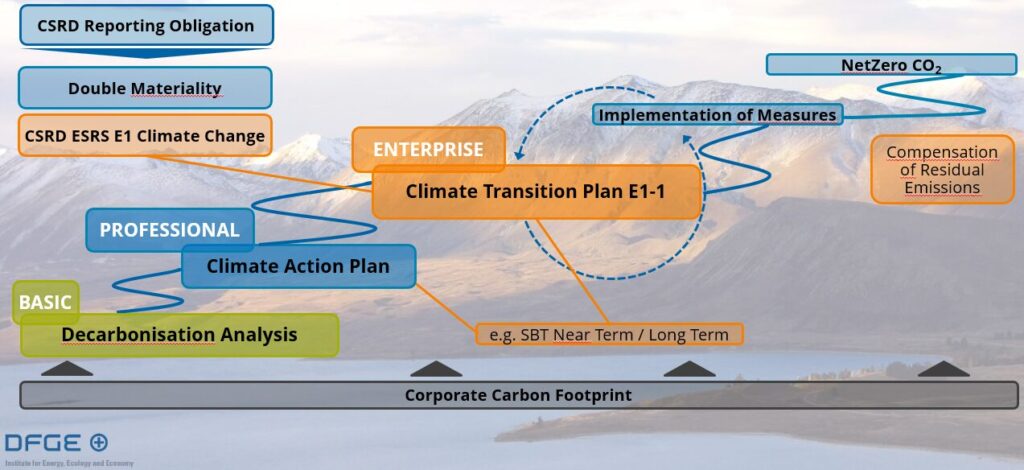Reduction of the Carbon Footprint by concrete measures
The basis of any corporate climate strategy is the understanding of the company’s current carbon footprint (Corporate Carbon Footprint – CCF), i.e. the amount of CO2 emissions the company is currently emitting in each emission category. Greenhouse gas (GHG) emissions consist of Scope 1 emissions (direct emissions, e.g. from combustion processes), indirect Scope 2 emissions from the purchase of grid-bound energy such as electricity, and other indirect Scope 3 emissions from processes that are directly or indirectly caused by the company, e.g. through purchased goods and services.
The main objective of a Climate Action Plan is to develop a well-structured plan of action to reduce the company’s carbon footprint. This includes, for example, improving energy efficiency, switching to renewable energy sources and optimizing supply chains, taking into account and balancing the emission reduction targets that the company has set itself. On the path to decarbonisation, the first step is basically a careful examination of the CCF (Decarbonisation analysis) to identify the key decarbonisation levers and determine reduction potentials. In addition to the hotspot analysis, the emissions must also be allocated to Scope 1 and 2 according to their source to derive concrete fields of action and measures to reduce emissions.
The actual Climate Action Plan is the result of the systematic development of an action plan involving the relevant stakeholders in the company. This strategic tool helps companies develop a clear and robust plan to reduce CO2 emissions. It addresses specific steps and measurements to reduce the carbon footprint and should ideally already be aligned with the company’s climate targets (e.g. Science-Based Targets – SBT). For companies that will be subject to CSRD reporting in the future, the requirements of the Corporate Sustainability Reporting Directive (CSRD) should already be taken into account when developing a Climate Action Plan. It is also advisable to implement a regular evaluation process (KPI dashboard) at this stage to control and monitor the measures and their effects.

DFGE Support
At DFGE, we are happy to assist you in developing a Climate Action Plan. If your company becomes subject to reporting under the Corporate Sustainability Reporting Directive (CSRD) at a later date, we will of course also help you to develop an existing Climate Action Plan into a CSRD-compliant Climate Transition Plan. We are also there to assist you with general CO2 reporting (CSR reporting) and CO2 offsetting measures. If you have any further questions, please contact us at or by phone at +49 8192-99733-20.









